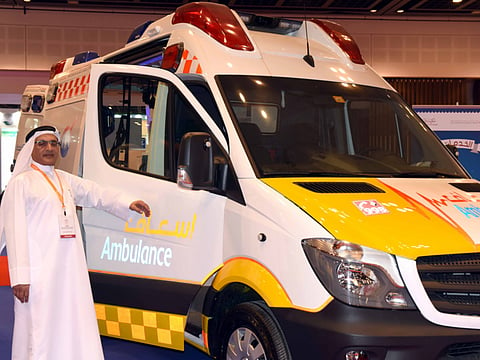Address Hotel fire now a case study in record emergency response
Paramedics reached the spot in ‘0 minutes’, says top DCAS official

DUBAI: Three months after the Address Hotel was gutted by a fire on New Year’s Eve in Downtown Dubai, a top official said the city’s emergency medical services responded in a record 0 minutes around the site.
Addressing the first Dubai Inter-national Ambulance Conference (DIAC) in Dubai on March 21, Dr Omar Al Sakaf, director of medical and technical affairs at the Dubai Corporation for Ambulance Services (DCAS), said a high level of preparedness by the ambulatory services and other departments, including Dubai Police and Civil Defence, ensured that immediate help was extended to those in the thick of the situation.
Minor injuries
Making a special presentation on “Managing New Year Eve in Dubai”, he said: “Despite the huge crowd of New Year revellers who had gathered in Downtown, our paramedics could respond immediately as our ambulances were stationed in the Burj Khalifa area.”
Dr Al Sakaf said 13 people sustained minor injuries, 11 of whom were taken to hospital. Life-threatening cases comprised just one per cent of the patients, cardiac and medical 39.6 per cent each, trauma 20.7 per cent, respiratory 2.5 per cent and obstetrics and gynaecology one per cent.
He said close coordination between the civil defence, police, security, emergency medical service providers and event organisers helped to ensure that the New Year celebrations were back on track by the stroke of midnight. “Failing to plan is planning to fail,” he added.
A busy night for DCAS which received over 700 calls that night, it activated all its ambulatory stations around the city and added more mobile stations in crowded areas.
Dr Al Sakaf said events vary in size and potential for damage and crowd management techniques have to be adopted accordingly. From a medical point of view, he noted that 0.3 to 1.3 per cent of attendees in a typical event actually require medical assistance. In general, the concerns pertain to dehydration, alcohol abuse, injuries from broken glass, fainting, traumatic injuries and respiratory problems.
But at the end of the day, handling these cases depends on the level of preparedness.
Subroto Das, CEO of Lifeline Foundation, presented a paper on the lessons learnt in mass casualty management during the 2001 Bhuj earthquake in India.
Professor Hideharu Tanaka, researcher from Japan, made a presentation on crisis management in the face of the Fukushima nuclear meltdown that evolved after the big earthquake in Japan in 2011.



